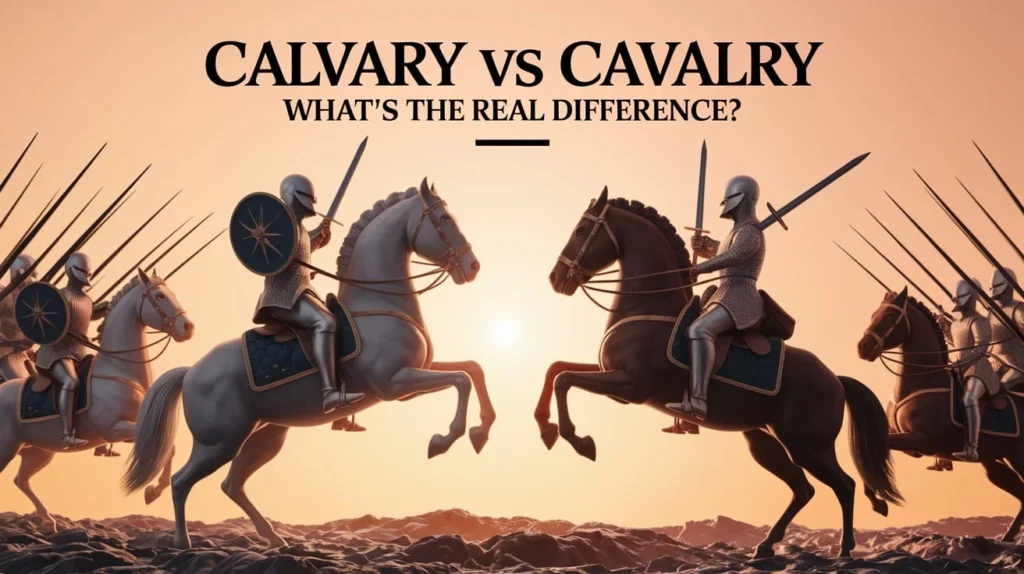When it comes to words that look almost identical but carry completely different meanings, Calvary and Cavalry are two of the most common offenders. It’s easy to see how they could be confused, especially given their similar spellings and sounds.
However, understanding the distinction between the two can prevent embarrassing errors in writing or speech. Whether you’re a student, a writer, or someone looking to polish your language skills, it’s essential to get these terms right.
In this article, we’ll dive deep into the differences between Calvary and Cavalry, exploring their definitions, origins, and the contexts in which they are used.
By the end, you’ll not only understand the distinction but also feel confident using each term correctly. Let’s start by defining these terms clearly.
What is “Calvary”?
Definition and Origins of “Calvary”
The word Calvary refers specifically to the hill in Jerusalem where Jesus Christ was crucified. It comes from the Latin word “Calvaria”, meaning “skull”, which is a translation of the Aramaic word “Golgotha”. In religious contexts, Calvary is often a deeply spiritual term associated with the suffering and sacrifice of Jesus.
Historical and Religious Significance
Calvary is one of the most important places in Christianity. The crucifixion of Jesus, which occurred on Calvary, is a central event in Christian theology, symbolizing redemption, forgiveness, and hope for humanity. It is often depicted in art, literature, and religious ceremonies.
For example, the famous hymn “On a Hill Far Away” references Calvary as the site of the crucifixion, while churches around the world commemorate the Stations of the Cross, which represent Jesus’ journey to Calvary.
What is “Cavalry”?
Definition and Origins of “Cavalry”
Cavalry refers to military units that fight on horseback. Historically, cavalry was one of the primary means of warfare in various cultures, including the Mongols, Romans, and Napoleonic France.
In modern terms, cavalry can also refer to armored units or mechanized infantry that use tanks, armored vehicles, or even helicopters for rapid response.
The term Cavalry originates from the French word “cavalerie”, which in turn comes from the Italian “cavalleria”, meaning “horsemen”. Over time, the word evolved to represent not just the men riding horses but the entire military branch associated with them.
Cavalry’s Role in History
The cavalry has been crucial in battlefields throughout history. Cavalry units were often used for their mobility and speed, allowing them to strike swiftly, scout enemy positions, and chase down fleeing foes. Famous cavalry units include the Mongol horsemen, Napoleon’s cavalry, and the U.S. cavalry during the American Civil War.
Today, while traditional cavalry units are less common, modern equivalents such as tank divisions and airborne units still embody the original cavalry spirit: speed, mobility, and power.
Visual & Phonetic Differences
While Calvary and Cavalry may seem almost identical, they are quite distinct both visually and phonetically. Understanding these differences can help prevent errors.
Phonetic Differences
- Calvary is pronounced /ˈkæl.və.ri/, with the emphasis on the first syllable.
- Cavalry is pronounced /ˈkæv.əl.ri/, with the emphasis on the first syllable as well but with a slightly different middle sound.
To help remember this, think of “Calvary” as a solemn term, often linked to religious imagery, while “Cavalry” is more military-focused.
Visual Differences
Here’s a quick comparison to make the distinction clearer:
| Word | Pronunciation | Meaning | Usage Example |
| Calvary | /ˈkæl.və.ri/ | Hill of Jesus’ crucifixion | “He spoke about Calvary with reverence.” |
| Cavalry | /ˈkæv.əl.ri/ | Horse-mounted troops | “The cavalry arrived just in time.” |
Visual Mnemonics
- Calvary: “Calv” like “cross”, remembering Jesus’ crucifixion.
- Cavalry: “Cav” like “cavalier”, relating to horsemen.
Common Mistakes and Misuses
One of the most frequent errors in everyday language is confusing Calvary and Cavalry. Given their similar spellings, people often make the mistake of using them interchangeably.
However, the consequences of this mix-up can be more than just grammatical; it can change the entire meaning of a sentence.
Examples of Misuse
- Incorrect: “The soldiers marched to Calvary to defend the town.”
- Correction: “The soldiers marched to Cavalry to defend the town.”
- Correction: “The soldiers marched to Cavalry to defend the town.”
- Incorrect: “He talked about the Cavalry with deep respect and faith.”
- Correction: “He talked about the Calvary with deep respect and faith.”
- Correction: “He talked about the Calvary with deep respect and faith.”
These examples highlight how misusing these terms can confuse readers or listeners, especially when it comes to sensitive topics like religion or military history.
Calvary in Culture and Faith
Religious Importance
In Christianity, Calvary represents the ultimate sacrifice and a place of redemption. It is where Jesus Christ endured suffering for the forgiveness of sins, offering hope and salvation to believers.
Many Christian hymns, like “The Old Rugged Cross,” center on Calvary as the symbol of salvation.
For Christians, Calvary isn’t just a historical place—it’s a spiritual landmark that serves as a constant reminder of God’s love and the suffering of Christ for humanity’s salvation.
Calvary in Art and Literature
Artists and writers have used Calvary to depict themes of suffering, sacrifice, and redemption. Gothic art often portrays the crucifixion of Christ on Calvary, while classic literary works like The Divine Comedy and The Brothers Karamazov explore its significance.
Cavalry in History and Pop Culture
Cavalry in Warfare
The Cavalry played a key role in numerous historical battles. One of the most famous examples is the Mongol cavalry, led by Genghis Khan, which used speed and precision to conquer vast territories across Asia. During the Napoleonic Wars, the French cavalry was equally feared for its strategic mobility.
Modern-Day Cavalry: Tanks and Armored Units
In modern warfare, cavalry has evolved into tank divisions, helicopter units, and mechanized infantry. These modern equivalents continue to serve the same purpose: fast, mobile forces capable of delivering a significant impact.
How to Always Get It Right
Knowing the differences between Calvary and Cavalry may seem easy, but it’s common for even experienced writers and speakers to mix them up. Here are some tips to help you avoid making this mistake:
Quick Tips to Remember
- Calvary: Always relates to the crucifixion of Jesus or a religious context. Think of “Cross” and “Christ”.
- Cavalry: Always refers to mounted soldiers or military units. Think of “cavalier” (horseman) or “charge”.
Context Is Key
When in doubt, always look at the context. Calvary will likely appear in religious discussions, while Cavalry will show up in military or historical settings.
Quiz: Test Your Knowledge
Ready to put your knowledge to the test? Below is a short quiz to check if you can distinguish between Calvary and Cavalry.
- The general led his troops to ______ for the final charge.
a) Calvary
b) Cavalry - Christians gather each year to commemorate the ______ of Jesus.
a) Calvary
b) Cavalry - The ______ was instrumental during the American Civil War.
a) Calvary
b) Cavalry
Conclusion
Understanding the difference between Calvary and Cavalry is more than just a matter of spelling—it’s about recognizing the significance and historical context each term holds. While they may appear similar at first glance, they serve very distinct roles in language and culture.
- Calvary is tied to religion and sacrifice, symbolizing the crucifixion of Jesus and offering profound spiritual meaning within Christianity.
- Cavalry, on the other hand, is deeply connected to military history, representing mounted soldiers or horsemen who played key roles in various historical battles, and continues to symbolize speed, mobility, and strength in modern warfare.
By understanding these differences, you can confidently use each word correctly in the appropriate context. Whether you’re discussing spiritual topics or military history, keeping these terms distinct ensures clear and effective communication.
FAQs
- Is Calvary ever used outside of religious contexts?
- While Calvary is most often associated with the crucifixion of Jesus and Christianity, it can also be used metaphorically to describe any place or situation of intense suffering or sacrifice.
- While Calvary is most often associated with the crucifixion of Jesus and Christianity, it can also be used metaphorically to describe any place or situation of intense suffering or sacrifice.
- Can Cavalry be singular?
- Yes, the word Cavalry is typically used in its plural form, but you can specify a singular unit or individual by referring to a Cavalry unit or Cavalry soldier. The term refers to the group but can describe individual soldiers when necessary.
- Yes, the word Cavalry is typically used in its plural form, but you can specify a singular unit or individual by referring to a Cavalry unit or Cavalry soldier. The term refers to the group but can describe individual soldiers when necessary.
- Why do people mix them up so often?
- The spelling similarities and similar pronunciations of Calvary and Cavalry often lead to confusion. Since both are used in quite distinct contexts (one religious, the other military), it’s easy to see why they are sometimes interchanged.
- The spelling similarities and similar pronunciations of Calvary and Cavalry often lead to confusion. Since both are used in quite distinct contexts (one religious, the other military), it’s easy to see why they are sometimes interchanged.
- Are there other common word pairs like this?
- Yes, many pairs of words in English look or sound similar but have completely different meanings. Some common examples include:
- Affect vs. Effect
- Compliment vs. Complement
- Accept vs. Except
- Stationary vs. Stationery
- Elicit vs. Illicit
- Affect vs. Effect
- Yes, many pairs of words in English look or sound similar but have completely different meanings. Some common examples include:
- How can I avoid confusing similar words in the future?
- The key is to contextualize each word. Consider the subject matter carefully: If the context is religious or related to Jesus’ crucifixion, you are likely referring to Calvary. If it’s about mounted soldiers or military operations, you are dealing with Cavalry. Also, practice and becoming familiar with common confusions will help solidify your understanding.




